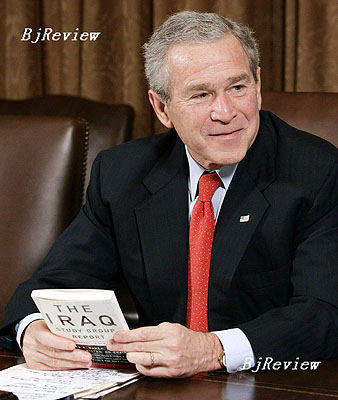
When his unpopular war against Iraq entered its fourth year on March 20, it actually was only one of U.S. President George W. Bush's various headaches.
After his protest-rich Latin American tour in mid-March, Bush returned home to a string of scandals in his government. He was put on the spot to defend both the Attorney General Alberto Gonzales against a call for his dismissal because of the "mistaken" ousting of eight federal prosecutors, and Scooter Libby, Vice President Dick Cheney's former chief of staff, who revealed the identity of a female member of the CIA. The president also had to answer for the exceptionally unhygienic conditions in the Walter Reed Army Medical Center, the top military hospital, just five miles from the White House.
Nevertheless, the eye of the storm continues to be his Iraq policy. To restore peace in the war-torn country seems far more difficult than bringing down the dictatorship of Saddam Hussein.
"The new strategy will need more time to take effect until Baghdad's citizens feel secure in their own homes and neighborhoods," said Bush as he tried to persuade people to be patient during a televised speech from the White House to mark the anniversary of invasion. He asked for additional funding and military reinforcements to implement his newly revised battle plan. "It will be difficult for Iraqis to make further progress toward political reconciliation or economic rebuilding, steps necessary for Iraq to build a democratic society," he added.
However, Democrat House Speaker, Nancy Pelosi, was swift with her rebuke, saying the American people "have lost confidence." She warned the embattled Bush that his failed approach would be rejected by Congress. Actually, the House has set about a timeline for the phased redeployment of U.S. military before substantial withdrawal, according to House Democratic Whip James E.Clyburn.
Anti-war demonstrations were widely seen in the United States on March 20 with several protestors being detained.
A poll, sponsored by major U.S. media, showed that only 18 percent of Iraqis have confidence in the Bush administration, while his approval rating dropped nearly to an all-time low. Most Americans are afraid that their family members serving in the army will be victims of violence in further battles.
"By diverting attention from Al Qaeda and stretching our troops to the breaking point, the Iraq war has made America less safe. The war can only be won politically and by forcing Iraq's political factions to resolve their differences."
Senate Majority Leader, Harry Reid, talking about a redeployment proposal of the U.S. government
"If the current security plan succeeds, Iraq will be on the right path to survival, but if it fails we will see Iraq even worse."
Adnan al-Dulaimi, a heavyweight from the Sunni political bloc in the Iraqi parliament, predicting obscure destiny of his homeland
"The walls of isolation and the aid embargo are cracking."
Ziad Abu Amr, foreign minister of the new Palestinian coalition cabinet, predicting the end of the European aid boycott that has left the Palestinian economy reeling, after taking office on March 17
"I don't think it's a surprise to anybody that a country as large as China might have ambitions like that."
Mike Bair, head of Boeing's 787 "Dreamliner" program, saying on March 19 that the U.S. aviation giant welcomes China's plan to design and build large airplanes that can carry more than 150 passengers
"Ever closer union is a challenge right now because it has grown ever wider, and it is increasingly difficult to find consensus."
Antonio Missiroli, chief analyst at the European Policy Centre, a Brussels research institute, warning that the EU is becoming more divided after 50 years in existence
"We unfortunately still have a long way to go, because there may be some fundamental misunderstandings on what are the expectations of the government of Sudan and what is on offer."
Jean-Marie Guehenno, UN Under Secretary General for Peacekeeping Operations, admitting on March 19 that the deployment of international peacekeepers in Sudan's war-torn Darfur region is unlikely in near future
"It is impossible that Shanghai will be submerged by 2050, because climate change tends to be only periodical, and our defenses will grow accordingly."
Chen Manchun, researcher with the Tianjin-based National Marine Data and Information Service, dismissing claims by a British journalist that rising tides will engulf Shanghai, Tianjin and other Chinese coastal cities in 50 years
| 